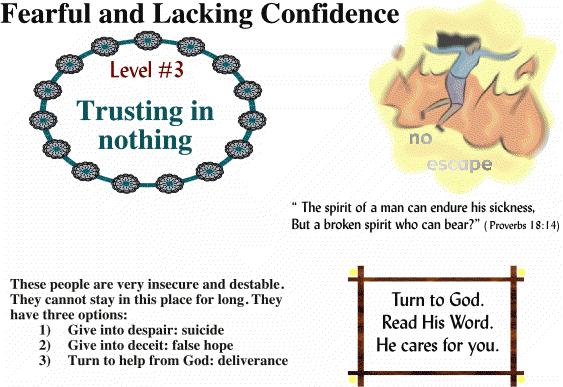Fearful and Lacking Confidence
 The basic difference between the average and extreme worrier is that the common worrier is still able to find some kind of solution for their situation. They still have some hope in themselves or others that the situation will be dealt with. The basic difference between the average and extreme worrier is that the common worrier is still able to find some kind of solution for their situation. They still have some hope in themselves or others that the situation will be dealt with.
The extreme worrier is worrying about their worries. They not only lack a solution but worry that there is none. These worriers have lost their confidence in being able to cope. Their preoccupation of their perceived 'impossible' situation is so great that they begin to believe the worse will occur. When worry accepts these threats as possible, then fear arises.
The lost of objectivity makes these situations seriously dangerous because anything could happen. It is true that sometimes drugs can be to be used to quiet panicky people down. One can reason with them, but rarely will it do them any good. It is like telling a thirsty person to get a drink from falling rain.
This group of people are very insecure and unstable. They cannot stay in this third level for too long. They have three options:
- 1) Give into despair which leads to suicide.
- 2) Give into deceit. They have to delude themselves through medicine or other methods to lessen the symptoms.
- 3) Turn to God for help. God is so willing to help people come back to Him.
"As a result, we are no longer to be children, tossed here and there by waves, and carried about by every wind of doctrine, by the trickery of men, by craftiness in deceitful scheming..." (Ephesians 4:14)
" The spirit of a man can endure his sickness, But a broken spirit who can bear?" (Proverbs 18:14)
|
|
Class Demonstration
|
 |
Pick four people to stand up front. They will split into two teams, two each. One team member will hold blocks. The other team member will pile the blocks on the pile in his hands.
The only difference will be that one team will hold the blocks in the air while another will hold the foundation block steady on something flat and firm.
Which team can build a taller set of blocks.
|
If we could just understand that all worry stems from our lack of trust in God, we would send these people to pastors instead of counselors. Only Jesus can help them find healing in their souls. Instead they are run back and forth between medical wards. Side effects of these powerful drugs are rarely mentioned. We must insist on dealing with the causes not just the symptoms. Otherwise the person's situations will get worse and worse so that the symptoms threaten a person's insanity or even life.
Anytime a person loses confidence and trust, then he is very unstable.
Most anxious people still have confidence that there is a solution. True, they are perplexed over how to solve it. They waste a lot of valuable sleep or work time thinking through solutions. But they still have confidence. Once they get to the point of no solution, however, then they get panicky.
Complicating this problem is a person's fear on admiting their inability to handle something. This is a difficult step if you do not know there is anyone who can help you. Many people never are able to reach this stage and are rushed in ambulances into medical wards. Their fear of no available or easy solution paralyzes them into near fatal patterns of avoidance and inaction. How I wish they would have confidence in God's love and care for them.
Hope is so valuable. Once a person has sought to overcome anxiety the last two, five or ten times, he begins to lose hope in a real solution. He enters a phase of life where he cannot cope with certain things. I believe as serious crises hit our nation, whether it be a shooting, twister or economic hit, many people who are just worldly worriers who think they can cope quickly become those who cannot cope.
They no longer have a way to work out their problem. They give up. This is why so many people committed suicide after the Great Depression. Their hopes were based on what they could handle. When the market seemed to shake, they would worry and get nervous. But when it collapsed, their hopes disappeared. They knew of no other way to cope.
In the case of an anxiety attack, worry and fear surges up within them. They doubt what we, and they took for granted. At some point, however, they no longer could trust those factors to be present.
Let me give you three examples.
| AIR |
PEOPLE |
FLYING |
We all take air for granted. But what would happen, if we started to question its availability or even our ability to breathe it? There might be air there as usual, but if we doubt it and do not trust its availability, then great fears arise.
We would start to panic. We would have no solution at hand. |
We take friends and parties for granted. We need people. But if we started to question what might happen wrong when we were with people, then worries and fears would swell up inside us. These people would then tend to avoid such situations like the plague.
After hearing the Israel shooting at their daughter's bat-mitspah, one could easily see how a person could begin to worry about being in large groups.
|
We are more familiar with the worries about flying. Many people still refuse to fly due to the 911 massacre. Other people wonder why anyone would have trouble flying.
Fears and worries about what might happen begin to occupy their minds, and they just refuse to fly. The airlines have suffered a huge financial lost because of the fear of flying. They laid off tens of thousands.
|
Special dangers for Level 3:
Level 3 is a very unstable level. The following three situations make them especially dangerous.
- Loose objectivity - cannot discern what is true or not. Very vulnerable. Mind is confused.
- Physical harm -emotional upheaval causes physical troubles. Sleeplessness wears people thin.
- Social isolation - tend to be alone; on the fringe of society.
Let's look at a summary of these three levels. Next page.
|



